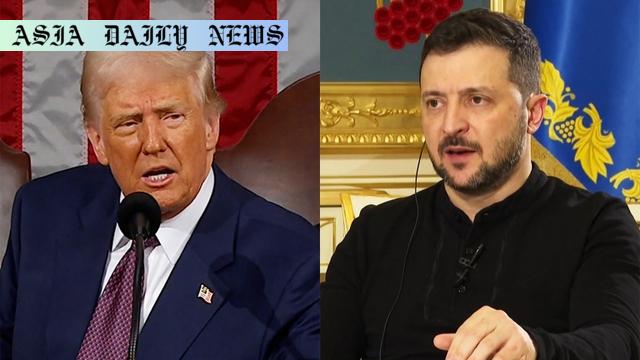Trump Zelenskyy Moscow: FT reveals Trump questioned Zelenskyy about striking Russian cities if given long-range weapons.

Trump’s Reported Query to Zelenskyy: A Catalyst for Speculation
According to the Financial Times, former US President Donald Trump held a striking conversation with Ukrainian President Volodymyr Zelenskyy on July 4, which has since captured international attention. The report suggests that Trump inquired if Ukraine could hit Russian cities such as Moscow and St. Petersburg, provided that the US delivered long-range weapons to Kyiv. This pivotal question, steeped in controversy, reflects the escalating complexities of US-Ukraine cooperation amid the ongoing conflict with Russia.
In response, Zelenskyy reportedly indicated Ukraine’s readiness to act on such a measure, stating that they could target Moscow if adequately armed. These statements, though unverified in full, signify the extent of active discussions between Kyiv and Washington regarding military capabilities. Trump later clarified to reporters that he did not intend to encourage strikes on Moscow and emphasized that the US is not considering supplying Ukraine with long-range missiles as of now.
Trump’s Stance on Russian Conflict and Weapon Supplies
In his broader approach to the ongoing war, Trump maintained pressure on Moscow. Recent remarks indicate a commitment to bolstering Ukraine’s defenses with additional weapons, including the sophisticated Patriot air defense systems. Trump also introduced a specific timeline for potential peace agreements, suggesting that Russia should aim to secure a deal within 50 days while warning of severe economic consequences.
Notably, Trump hinted at the imposition of steep tariffs against Russian exports as leverage to hasten a resolution. Such measures, while potentially effective, could exacerbate tensions with Russia, further complicating the road to a peaceful settlement. These comments highlight the intricate balancing act the US is navigating, supporting Ukraine while aiming to deter Russia from prolonging hostilities.
Global Reactions: Russia, China, and Diplomatic Maneuvers
The global fallout from Trump’s statements underlines the sensitivity of these high-stakes discussions. The Kremlin, for its part, labeled Trump’s inquiries as serious, indicating a need for careful scrutiny of US intentions toward the conflict. Dmitry Peskov, the Kremlin spokesperson, expressed the government’s commitment to thoroughly analyzing Trump’s actions and rhetoric.
Meanwhile, China stepped into the discourse, particularly critiquing Trump’s proposed tariffs. Lin Jian, a spokesperson for the Chinese Foreign Ministry, underscored that unilateral economic pressures, such as tariff wars, typically fail to produce constructive outcomes. Diplomatic efforts between China and Russia have continued, with President Xi Jinping recently meeting Russian Foreign Minister Sergey Lavrov to affirm their partnership. This development serves as a reminder of global power dynamics at play amid the broader conflict.
Analysis: Implications for US Foreign Policy
The news of Trump’s engagement with Zelenskyy raises questions about the long-term implications for US foreign policy, especially regarding military support. The discussion of potential strikes deep into Russian territory reflects a bold, albeit speculative, approach to escalation. While Trump publicly denied intentions to expand Ukraine’s offensive capabilities significantly, the dialogue indicates a nuanced push to assess Kyiv’s willingness to exert pressure on Moscow.
This episode illustrates the persistent balancing act for US leaders in managing international alliances, crafting strategic responses to global conflicts, and navigating domestic political landscapes. As nations like Russia and China react strongly to such developments, the broader consequences for international stability remain uncertain.
Commentary
Interpreting Political Rhetoric and Real Intentions
The reported interaction between Donald Trump and Volodymyr Zelenskyy highlights the intriguing intersection of diplomatic dialogue and political calculation. While Trump’s line of questioning to Zelenskyy may have been exploratory, the implications remain significant. Asking whether Ukraine could strike Moscow, particularly in the context of weapon supplies, treads delicate ground, risking misinterpretation and backlash on multiple fronts.
Diplomatic Challenges in Conflict Escalation
From a geopolitical perspective, Trump’s remarks underscore the multifaceted challenges of engaging in diplomacy during high-stakes conflicts. The intention behind his question—whether aiming to test boundaries, provoke dialogue, or signal commitment—serves as a reflection of the broader complexities tied to US involvement in Ukraine’s defense. Public perception, both domestic and international, contributes to shaping outcomes of such sensitive discussions.
Broader Implications for Global Diplomacy
It is crucial to view these developments within the broader framework of global diplomacy. The reactions from Russia and China underline the intricate web of alliances, power balances, and economic frameworks currently at play. As nations scrutinize and react to such provocative statements, the risks of miscommunication or unintended escalation increase.


